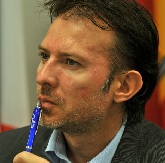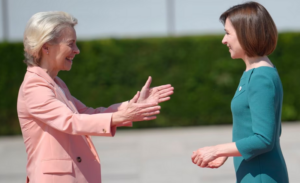 Economistul Florin Cîțu i-a adresat o scrisoare deschisă directorului FMI Cristine Lagarde, aflată luni și marți într-o vizită în România.
Economistul Florin Cîțu i-a adresat o scrisoare deschisă directorului FMI Cristine Lagarde, aflată luni și marți într-o vizită în România.
În scrisoarea deschisă, analistul Florin Cîțu îi cere directorului FMI să nu încheie un nou acord cu România, invocând faptul că FMI a legitimat politicile guvernamentale din ultimii ani chiar și atunci când acestea doar au mimat reformele la care România s-a angajat chiar prin scrisorile de intenție cu FMI.
”FMI a fost spectator în timp ce stocul de arierate s-a dublat comparativ cu 2008 şi a rămas apoi la acest nivel. FMI a fost spectator şi a privit cum companiile de stat, care ar fi urmat să fie privatizate, au rămas o gaură pentru resursele bugetare. FMI a fost spectator şi a privit cum banca centrală ratează propriile ţinte de inflaţie în fiecare an (inflaţia a fost mai mare decât ţintele). FMI a fost spectator şi a asistat cum salariile din sectorul public au fost tăiate doar pentru şase luni şi apoi reîntregite în doi ani, în timp ce restul economiei rămânea în criză, iar şomajul continua să crească. FMI a fost spectator în timp ce propriile estimări privind performanţa economiei au fost prea optimiste în fiecare ani începând cu 2009” – scrie Florin Cîțu în scrisoarea deschisă către Christine Lagarde.
”Vă scriu pentru a vă ruga să nu mai semnaţi un nou acord stand-by între România şi FMI chiar dacă un asemenea acord va fi etichetat ca «preventiv». Din păcate, aceasta este singura opţiune viabilă pentru ca economia românească să revină pe creştere şi pentru ca clasa politică să-şi asume reformele economice. Într-adevăr, relaţia FMI-România este una veche. Cea mai mare parte dintre acordurile stand-by cu toate că nu au fost finalizate au contribuit la designul actual al economiei româneşti. Până la ultimele două acorduri această contribuţie a fost în mare parte pozitivă. Cu toate acestea, începând din 2009 relaţia FMI-România nu a fost una benefică pentru economie sau pentru populaţie” – mai scrie Cîțu.
Vă prezentăm, mai jos, textul integral al scrisorii deschise:
Open Letter to Ms. Christine Lagarde, Managing Director of the International Monetary Fund
Dear Ms. Lagarde,
I am writing to ask you not to sign a new stand-by agreement (SBA) between Romania and the IMF even if such an agreement is labeled “precautionary”. Unfortunately at this point it is the only way for Romanian economy to come back to economic growth and for its political class take ownership of the economic reforms.
Indeed the IMF-Romania relationship is an old one. Most of the stand-by agreements while not completed have contributed to the current design of the Romanian economy. Until the last two SBAs this contribution has been mostly positive. However, since 2009 the IMF-Romania relationship has not been a healthy one for the economy or its citizens.
At the onset of the last two SBAs the implicit promise was that reforms stipulated in the agreements would deliver economic growth. Indeed, most of the solutions, with the exception of higher VAT and “private management for State Owned Companies (SOC)”, would have been enhancing economic growth. Unfortunately it is exactly these solutions that were postponed by the Romanian political class. Furthermore, the postponement of economic reforms was endorsed by every IMF mission that gave a passing grade after each quarterly visit.
IMF stood by and watched while the stock of arrears doubled relative to 2008 and it remained there. IMF stood by and watched how SOC that were supposed to be privatized remained a drain on public resources. IMF stood by and watched how the central bank missed its inflation target every year (higher inflation than targeted). IMF stood by and watched how wages for the public sector were only cut for 6 months and then restored with two years while the rest of the economy remained in economic crisis and unemployment continued to rise. IMF stood by and watched while its own estimates of the economic health have been too optimistic for every year since 2009.
IF IMF would have “forced” any of these issues to be completed today Romania would not have a potential GDP that dropped from 5.5% in 2008 to less than 1% in 2013. Or, Romania would not have had still the highest inflation in the EU while being the poorest country. Instead, Romania has to borrow at high positive real rates to support a growing public sector , still at the highest costs in the region, while its economic growth for the last 4 years is “stabilized” close to zero. Under these circumstances the only thing Romania can do is to accumulate more debt to pay the old one.
When we draw the line the last 4 years of “reforms” leave the Romanian economy in worse shape than it was in 2008: significantly lower potential GDP, almost four times higher public debt, higher unemployment, a stock of arrears that is almost double relative to 2008, no progress in privatization, public wages at 7.4% of GDP higher than in 2007 year when economic growth was above 5%, current expenditures at the highest levels since 1989 as percentage of total expenditure, and of course inflation.
This outcome is not only the result of bad economic advice. Although increasing taxes in the middle of a recession is a textbook bad economic advice. This outcome is mostly the result of IMF “subsidizing” a corrupt Romanian political class. Every time IMF agreed to relax initial conditions, so that the SBA would not be declared off-track, it pushed Romania and its citizens further away from prosperity and it gave the political class one more argument to behave the same in the future. The best example is the recent announcement by the IMF that the 2011-2013 SBA has been successfully completed. But this solution did not help the Romanian economy. The fact that IMF said it is ok to have a higher public deficit due to higher public wages while the economy is stagnating is not growth enhancing. As it is not growth enhancing to miss the Net Foreign Assets and inflation targets by the NBR or not complete a single privatization during the last 4 years or to miss arrears targets not just in 2012 but every year since 2009. The successful completion of an SBA agreement under such circumstances only helps the political class and its independent institutions to gain more power but it does not help the Romanian economy or its citizens. I am certain that you and IMF are aware of that.
Dear Mrs. Lagarde, so far the Romanian political class and its public independent institutions hid their incompetence behind the IMF “umbrella”. The “successful” completion of the two SBAs had given the Romanian political class the right to continue its ways of “doing business” going forward even though the outcome for the economy and its citizens is disastrous. Signing a new SBA with Romania will only give more power to this political class and its independent institutions to maintain the status quo and keep Romania the poorest economy in the EU with the highest inflation. Romanian economy is too poor and too damaged to sustain two more years of postponement of economic reforms. In fact by signing another SBA the IMF will make it clear that its interests lie with the political class and not the health of the Romanian economy and the prosperity of its citizens.
I will close my letter by saying that in April 2008 I wrote an opinion in which I was asking for Romania to sign and SBA with IMF. I said the same thing in October, November and December 2008. In my view at the time IMF was the only institution capable of coercing the Romanian political class to implement reforms. Sadly the last 4 years showed me that IMF cares more about its own public image than actual results of the SBAs. Therefore, I respectfully ask you not to sign another SBA with Romania and transfer the reform ownership to the political class where it belongs.
With the utmost respect and consideration
Florin V. Citu










Un răspuns
Autorul „scrisorii deschise” are dreptate, in legatura cu cererea de a nu se mai incheia acorduri cu Romania, daca conditiile precedentului acord, n-au fost respectate.
Numai ca, FMI nu poate deveni „politia economica” a clasei noastre politice, asa cum nu este nici institut de „cercetare stiintifica”, care sa-i asigure „proiecte de reconstructie economica si industriala” Romaniei!
Limitele sale de banca europeana nu se vor a fi depasite, mai ales ca UE si FMI stie bine, ca niciodata clasa politica romaneasca, nu va realiza reformele stabilite – deoarece ele sint in interesul tarii, iar realizarea lor ar „goli” punga guvernantior!
Asa ca fiecare se multumeste sa se prefaca ca face ceva, iar daca nu exista rezultate, se face alta analiza, se motiveaza nerealizarile si mai trece un „ciclu de guvernare”, in care birocratii UE si FMI isi iau banutii.
La fel si clasa noastra politica, a mai bagat ceva bani la partid si in buzunarul propriu.
Intre UE-FMI si tarile integrate, nu exista raporturi de „raspundere economica”, ci numai politica, asa ca „totul curge” cu bine, pentru ambele parti…
Ce-i pasa UE si FMI de saracimea din Romania?